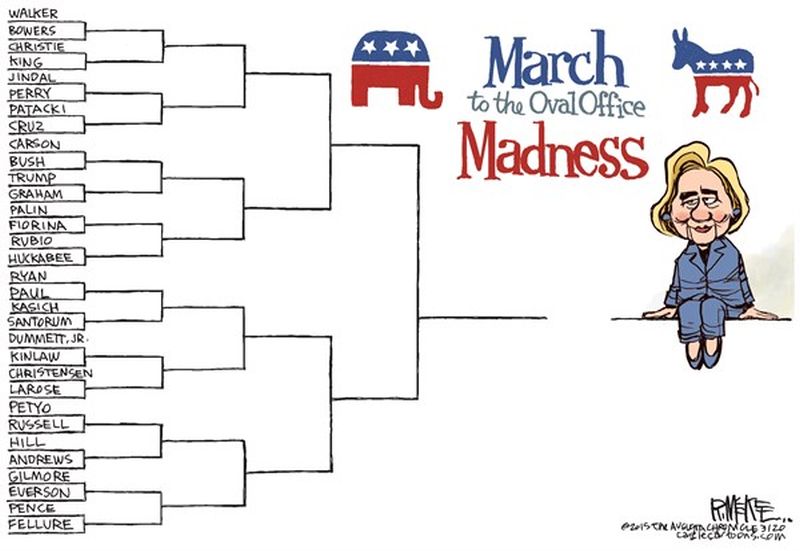If you have been keeping up with the Presidential primaries, you will note that there are currently seven Democratic candidates, with only one clear front-runner, and twelve Republican candidates with no clear front-runner. There are five third-party candidates running, but it has been proven that the way the current political system operates that a third-party candidate doesn’t usually gain much traction. What do all these choices mean? It means when the voters actually get to the booth, looking at the ballot, there won’t be much of a choice. The way American politics works is all or nothing, or “first past the post,” in the majority of states. The lovely time of year that we call primary season is meant to vet out which candidate party members would actually like to see running for President. A large number of candidates in the Republican Party show a lack of party cohesion and in turn, give a lack of options for voters.
Why does this matter? Because of first past the post, American electoral law favors the two major parties. It is very difficult for a third-party to make it onto the ballot, for starters. Campaign money also flows more easily, time on television is given more readily, and, generally, it is “easier” to campaign as a member of one of the major parties. In the United States, there are only two major parties, the Democrats and the Republicans. Bernie Sanders has stated that he is only running as a Democrat because he wants to be seen as a serious candidate in the eyes of the American people. After the 2000 election, with Ralph Nader supposedly taking away the votes that would’ve given Al Gore the race, Americans have felt that voting for a third-party is throwing their vote away Bernie Sanders and the Tea Party are two examples of people or organizations using the umbrella of a major political party in order to be heard. But, because “the Party” will only nominate one candidate, anyone else will either go to the wayside or have to completely fund their campaign on their own.
If we followed an alternative voting system, people like Bernie Sanders or Rand Paul wouldn’t need to align themselves to a major party to have a chance at winning. Also, the voters wouldn’t feel as though their vote was being thrown away by voting their conscience; it’s a system that allows more voices to be heard. Maybe we could head that way with a constitutional amendment since the electoral college wouldn’t allow for an alternative voting system.
The Republican Party is fractured. This is why the Tea Party isn’t its own party; the Republicans are split between fiscal conservatives and social conservatives. This is a bad mix when one candidate is meant to get a majority of states. The Reagan revolution gave a home to fiscally conservative Christians, but it seems as though many Republicans are rejecting the more radical beliefs of the Tea Party and looking for a moderate candidate. The problem is the way the primary system is set up, which is different for each state. Basically, the most politically active members of any party will be the ones to vote. And Tea Party members love to vote. This is how they win so many local elections. But to win a national election, candidates need to moderate their message and members of the Tea Party have shown they are unable to do so.
Why should we care? So many smart candidates aren’t taken seriously if he or she doesn’t run as a major party candidate and then seems to disappear once the “winning” candidate shows up. It’s all about money in politics, and the money is in the major parties. Because the United States follows first past the post, it’s easier for two candidates to run and receive a majority. Just like any competition, we like the visual of one versus one. But should that really be the way elections are? It’s not that way in many countries where smaller parties are able to gain seats and eventually take over majority parties. It would be nice if it was that easy in the United States.
I don’t know what will happen in the next year. It’s going to be an interesting show. But unless something fundamentally changes, I think I will be hoping to shake the hand of Madam President Hillary Clinton in 2016.



























